

 WASHINGTON - Amidst new reports that the armed forces are increasing their surveillance of online usage by military personnel, Servicemembers Legal Defense Network (SLDN) today cautioned service members to be especially careful when using the internet or posting information online.
WASHINGTON - Amidst new reports that the armed forces are increasing their surveillance of online usage by military personnel, Servicemembers Legal Defense Network (SLDN) today cautioned service members to be especially careful when using the internet or posting information online. In The Latest Example of a marketer becoming a producer and sponsoring commercial-free programming, Stolichnaya vodka has linked with the Logo channel for a documentary series about gay life in America.
In The Latest Example of a marketer becoming a producer and sponsoring commercial-free programming, Stolichnaya vodka has linked with the Logo channel for a documentary series about gay life in America.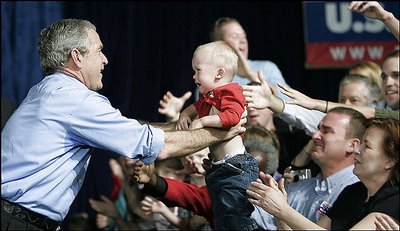 STATESBORO, GEORGIA - President Bush has for months cast the midterm elections as a choice about just two issues: taxes and terrorism. Now, with polls predicting bleak results for Republicans, he is trying to fire up his party by decrying gay marriage.
STATESBORO, GEORGIA - President Bush has for months cast the midterm elections as a choice about just two issues: taxes and terrorism. Now, with polls predicting bleak results for Republicans, he is trying to fire up his party by decrying gay marriage. Despite three decades of research on gay parenting, social scientists cannot conclusively determine whether children raised by homosexuals develop differently, for better or worse, than those raised by heterosexuals.
Despite three decades of research on gay parenting, social scientists cannot conclusively determine whether children raised by homosexuals develop differently, for better or worse, than those raised by heterosexuals. Daniel Craig has reportedly got the complete package - literally. According to his "Casino Royale" co-star, Judi Dench, the James Bond actor has a large penis, which is "an absolute monster!" Now whether that should be taken as an insult or a compliment, you decide.
Daniel Craig has reportedly got the complete package - literally. According to his "Casino Royale" co-star, Judi Dench, the James Bond actor has a large penis, which is "an absolute monster!" Now whether that should be taken as an insult or a compliment, you decide. ATLANTA, GEORGIA - It has long been the editorial policy of Atlanta Progressive News to use the word “homosexual” to describe persons who have a same-sex sexual orientation.
ATLANTA, GEORGIA - It has long been the editorial policy of Atlanta Progressive News to use the word “homosexual” to describe persons who have a same-sex sexual orientation. Really? What else is there?
Really? What else is there?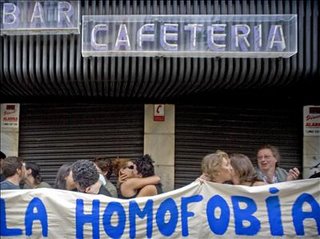 SPAIN - In what the organisers, the Defrente Association, called a ‘Visible display of gay tenderness’ dozens of gay couples held a Besada (kiss-in) outside the doors of a Seville bar on Saturday.
SPAIN - In what the organisers, the Defrente Association, called a ‘Visible display of gay tenderness’ dozens of gay couples held a Besada (kiss-in) outside the doors of a Seville bar on Saturday. Soon citizens of Wisconsin will have an opportunity to vote for a constitutional amendment which will ensure that our great state will not have the immoral, illogical, and unnatural absurdity of “same-sex marriage” foisted upon her by activist, unconstitutional judges.
Soon citizens of Wisconsin will have an opportunity to vote for a constitutional amendment which will ensure that our great state will not have the immoral, illogical, and unnatural absurdity of “same-sex marriage” foisted upon her by activist, unconstitutional judges.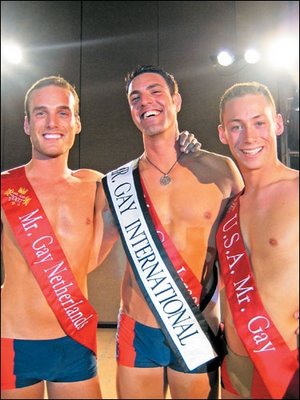 PALM SPRINGS, CALIFORNIA - A competitor from Tel Aviv, Israel, Nathan Shaked, 37, is the new Mr. Gay International after two days of competition in Palm Springs.
PALM SPRINGS, CALIFORNIA - A competitor from Tel Aviv, Israel, Nathan Shaked, 37, is the new Mr. Gay International after two days of competition in Palm Springs. ATHENS, GREECE - Societies that accept homosexual marriages have citizens who see those who are "different" as equals. This is why acceptance of homosexuality appears to be a very new phenomenon -- very different from the dominant mentality of groups for thousands of years. Yet as it stands complete acceptance looks like it will be reached only in the future.
ATHENS, GREECE - Societies that accept homosexual marriages have citizens who see those who are "different" as equals. This is why acceptance of homosexuality appears to be a very new phenomenon -- very different from the dominant mentality of groups for thousands of years. Yet as it stands complete acceptance looks like it will be reached only in the future.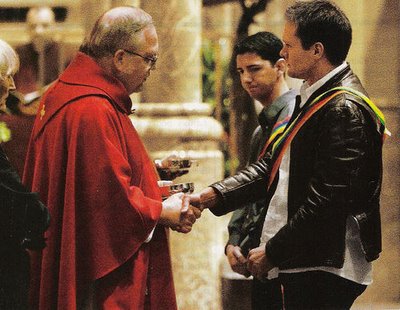 When the U.S. Catholic bishops meet in Baltimore Nov. 13-16, they will be asked to vote on guidelines for ministry to those with homosexual inclinations.
When the U.S. Catholic bishops meet in Baltimore Nov. 13-16, they will be asked to vote on guidelines for ministry to those with homosexual inclinations.
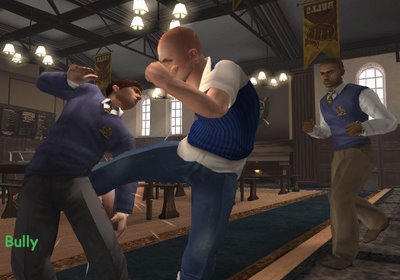 The video game maker that sparked uproar over a hidden sex scene in "Grand Theft Auto: San Andreas" is courting new controversy with its latest schoolyard title "Bully"--featuring boys kissing.
The video game maker that sparked uproar over a hidden sex scene in "Grand Theft Auto: San Andreas" is courting new controversy with its latest schoolyard title "Bully"--featuring boys kissing.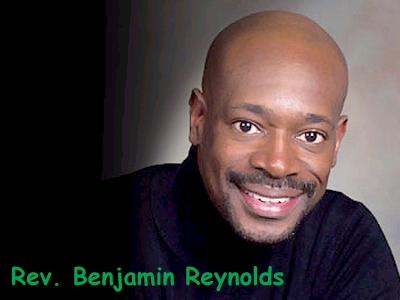 COLORADO SPRINGS, COLORADO - The Rev. Benjamin Reynolds, senior pastor of Emmanuel Missionary Baptist Church and one of Colorado Springs’ leading civil rights advocates, will step away from the pulpit Sunday, a few weeks after telling his congregation he is gay.
COLORADO SPRINGS, COLORADO - The Rev. Benjamin Reynolds, senior pastor of Emmanuel Missionary Baptist Church and one of Colorado Springs’ leading civil rights advocates, will step away from the pulpit Sunday, a few weeks after telling his congregation he is gay.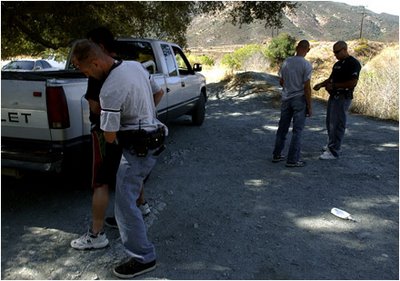 CAJON PASS, CALIFORNIA - A sexual playground hidden by foliage lies just off one of the most traveled freeways in the region. Secret coves, creekside paths, makeshift shelters with mattresses and easy chairs provide meeting places for men to indulge in sex and drugs.
CAJON PASS, CALIFORNIA - A sexual playground hidden by foliage lies just off one of the most traveled freeways in the region. Secret coves, creekside paths, makeshift shelters with mattresses and easy chairs provide meeting places for men to indulge in sex and drugs. UNIVERSITY OF TEXAS - William Lyons remembers the 10-minute bus ride that seemed to last an hour.
UNIVERSITY OF TEXAS - William Lyons remembers the 10-minute bus ride that seemed to last an hour.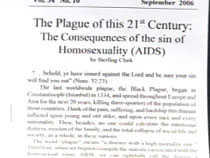 VANCOUVER - Neither rain, nor hail, nor sleet, nor snow nor refusal to deliver an anti-gay pamphlet will keep the mail from getting through.
VANCOUVER - Neither rain, nor hail, nor sleet, nor snow nor refusal to deliver an anti-gay pamphlet will keep the mail from getting through. The executive director of an organization that offers support to members and to the families of members of the "ex-gay" community -- former homosexuals and those struggling with unwanted same-sex attraction -- has a unique perspective on the Mark Foley scandal. While reproaches and recriminations abound in the media, she says someone needs to offer the disgraced former Congressman and others like him a message of hope and truth.
The executive director of an organization that offers support to members and to the families of members of the "ex-gay" community -- former homosexuals and those struggling with unwanted same-sex attraction -- has a unique perspective on the Mark Foley scandal. While reproaches and recriminations abound in the media, she says someone needs to offer the disgraced former Congressman and others like him a message of hope and truth.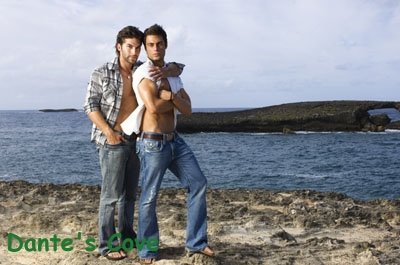 AOL has partnered with gay-themed cable network here! to distribute a selection of short form video clips via its AOL Gay & Lesbian channel.
AOL has partnered with gay-themed cable network here! to distribute a selection of short form video clips via its AOL Gay & Lesbian channel. SAN FRANCISCO, CALIFORNIA - New Jersey's Supreme Court ruling on same-sex unions is likely to make California's top court less receptive to authorizing gay marriage, legal experts said Thursday.
SAN FRANCISCO, CALIFORNIA - New Jersey's Supreme Court ruling on same-sex unions is likely to make California's top court less receptive to authorizing gay marriage, legal experts said Thursday.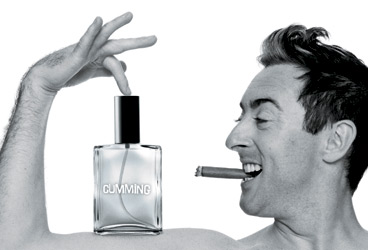 X2 star Alan Cumming is considering 'marrying' his boyfriend Grant Shaffer - with Cyndi Lauper and Liza Minnelli as bridesmaids The Scottish actor, 41, has been dating American artist Grant for two years and admits he has been considering a same-sex civil ceremony in his native Britain Cumming tells gay magazine Attitude, "Maybe (we'll marry) I think if we could get married in America we totally would have by now "I'd have my friends Andrew and Sue as bridesmaids and also Cyndi Lauper and maybe Liza "But then maybe she's had enough of gay weddings by now especially after her own!" Minnelli is currently in the middle of a bitter divorce battle with estranged husband David Gest Despite rumours over his sexuality, Gest has always insisted he is heterosexual.
X2 star Alan Cumming is considering 'marrying' his boyfriend Grant Shaffer - with Cyndi Lauper and Liza Minnelli as bridesmaids The Scottish actor, 41, has been dating American artist Grant for two years and admits he has been considering a same-sex civil ceremony in his native Britain Cumming tells gay magazine Attitude, "Maybe (we'll marry) I think if we could get married in America we totally would have by now "I'd have my friends Andrew and Sue as bridesmaids and also Cyndi Lauper and maybe Liza "But then maybe she's had enough of gay weddings by now especially after her own!" Minnelli is currently in the middle of a bitter divorce battle with estranged husband David Gest Despite rumours over his sexuality, Gest has always insisted he is heterosexual. SAO PAULO, BRAZIL - When nearly 2.5 million people converged on Sao Paulo this year for the world's biggest gay pride parade, the celebration emphatically reminded Brazil's presidential candidates of the growing political clout of the gay community.
SAO PAULO, BRAZIL - When nearly 2.5 million people converged on Sao Paulo this year for the world's biggest gay pride parade, the celebration emphatically reminded Brazil's presidential candidates of the growing political clout of the gay community. MIAMI, FLORIDA - Another former altar boy says he was sexually abused in the 1970s by the same retired Catholic priest who acknowledged fondling former Rep. Mark Foley when Foley was a teenager, the man's attorney said Wednesday.
MIAMI, FLORIDA - Another former altar boy says he was sexually abused in the 1970s by the same retired Catholic priest who acknowledged fondling former Rep. Mark Foley when Foley was a teenager, the man's attorney said Wednesday. A soldier convicted in connection to an anti-gay murder in 1999 has been released early by the U.S. Army, according to reports by an activist group.
A soldier convicted in connection to an anti-gay murder in 1999 has been released early by the U.S. Army, according to reports by an activist group. CALIFORNIA - The overwhelming majority of gay and bisexual men in California are aware of their own and their partner’s HIV status and many men choose to have unprotected anal sex with both primary and casual partners of the same HIV status, according to a study published in the October 24th edition of AIDS. The investigators recommend that recent studies showing an increase the prevalence of unprotected sex and the incidence of sexually transmitted infections should be interpreted in light of these findings and suggest that unprotected anal sex need not always imply that an individual is risking infection with, or transmission of, HIV.
CALIFORNIA - The overwhelming majority of gay and bisexual men in California are aware of their own and their partner’s HIV status and many men choose to have unprotected anal sex with both primary and casual partners of the same HIV status, according to a study published in the October 24th edition of AIDS. The investigators recommend that recent studies showing an increase the prevalence of unprotected sex and the incidence of sexually transmitted infections should be interpreted in light of these findings and suggest that unprotected anal sex need not always imply that an individual is risking infection with, or transmission of, HIV. CHICAGO - In a decision cheered by foes of routine circumcision for boys, a judge ruled on Tuesday that a 9-year-old need not be circumcised as his mother wanted.
CHICAGO - In a decision cheered by foes of routine circumcision for boys, a judge ruled on Tuesday that a 9-year-old need not be circumcised as his mother wanted. It's not all that often that a month-long trial begins in federal court where everyone knows from the start which side is likely to win.
It's not all that often that a month-long trial begins in federal court where everyone knows from the start which side is likely to win.